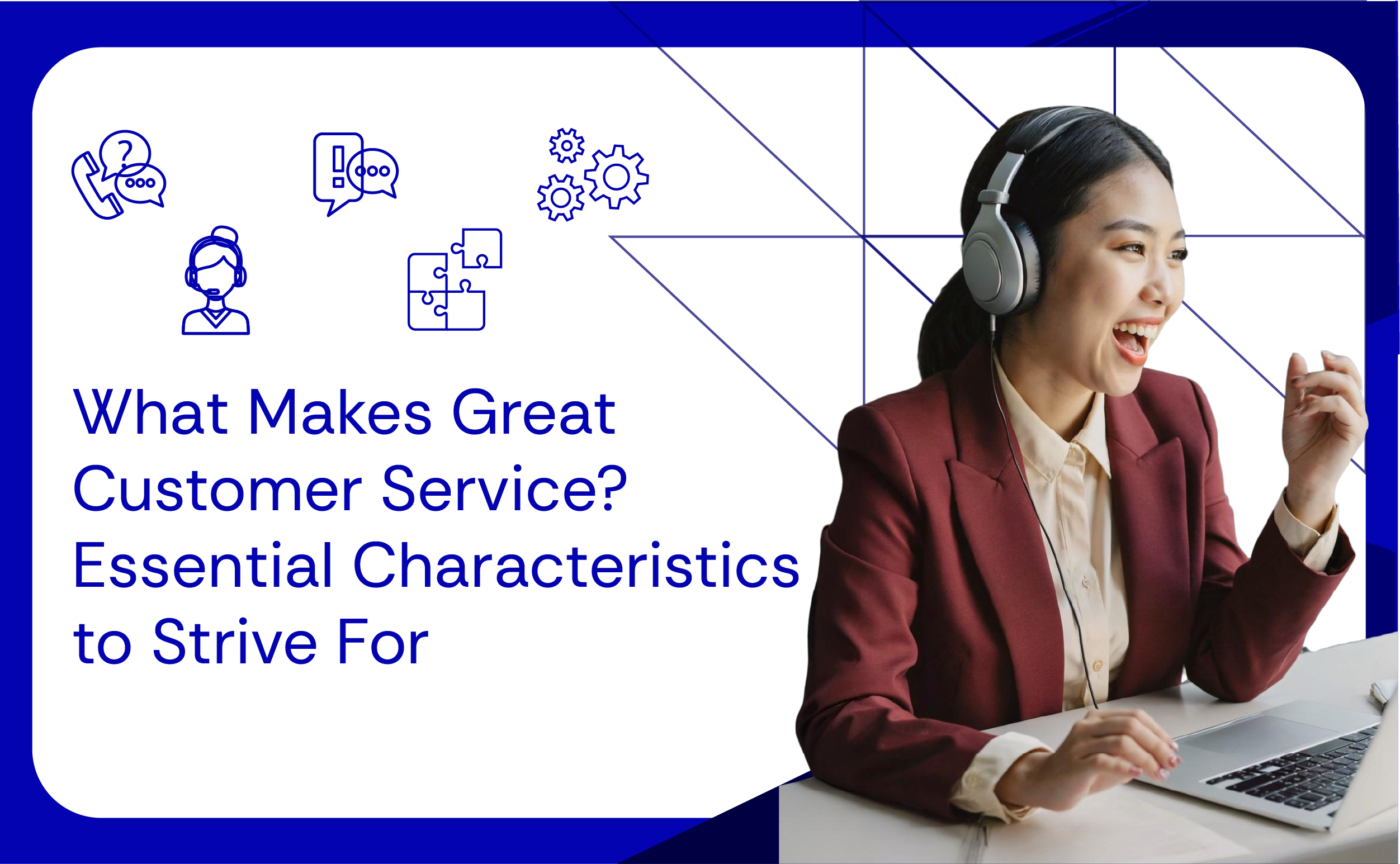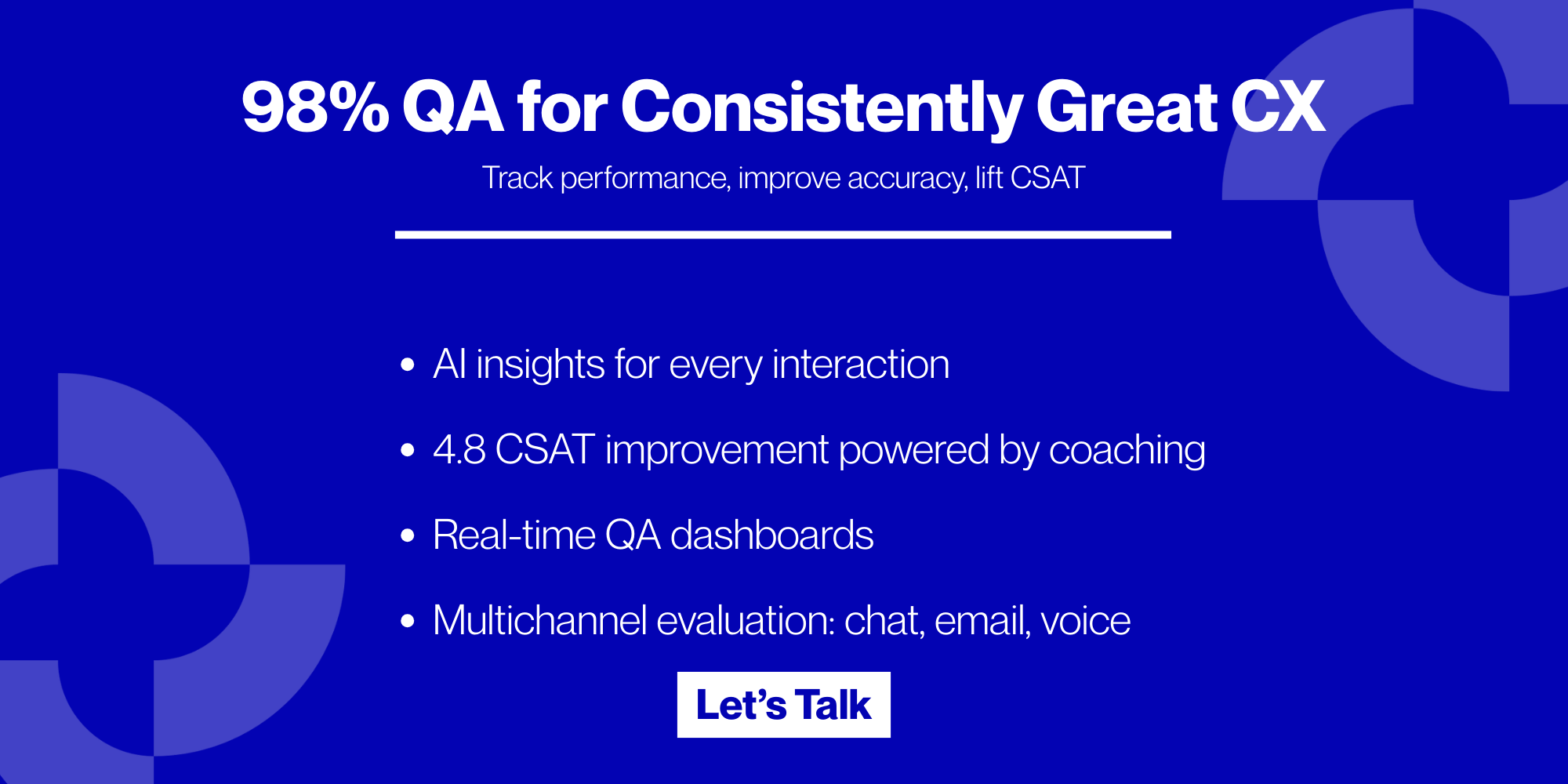Key Takeaways
- Great customer service goes beyond solving problems—trust, loyalty and long-term relationships.
- Speed, empathy, clarity and consistency are the core traits of standout support teams.
- Personalization and proactive help create memorable customer experiences.
- Exceptional service drives retention, referrals and measurable business growth for D2C and consumer brands competing in the U.S., U.K. & Australia.
What Is Great Customer Service?
At its core, great customer service is about how you make people feel while helping them. You could have the most efficient support process in the world, but if your customer walks away feeling frustrated, ignored, or like just another number? That’s not great service. Now flip it. Even if the issue takes a little longer to solve but the experience is warm, clear, and human? That’s the kind of service that sticks. That’s the kind that earns loyalty.
Great customer service means providing fast, effective and genuinely human support that makes people feel valued and understood. Great customer service doesn’t just fix issues—it builds relationships. It turns a stressful moment into a memorable one. And it makes customers think, “I’m glad I chose this brand.” Let’s dive right into the details of what makes great customer service!
Why Does Great Customer Service Matter?
You can have the slickest product, the coolest branding, or the most polished website in your industry—but service quality is what customers remember. Let’s break down why it matters so much:
- It’s the difference between a one-time buyer and a loyal fan: When someone has a great support experience, they’re not just more likely to stick around—they’re more likely to tell everyone about it. Great service turns customers into brand advocates. And nothing beats word-of-mouth. A study by Hubspot revealed that 93% of customers are more likely to make repeat purchases from companies that offer excellent customer service. And what’s better is that repeat customers spend up to 67% more than new customers. It’s a win-win all around!
- It builds trust: People want to buy from brands they trust. And trust is built through real interactions, especially when something goes wrong. How you show up in those moments matters.
- It’s your human edge: In a world where AI, automation, and bots are everywhere, real human connection stands out. A thoughtful, empathetic conversation can feel like a breath of fresh air, and that’s what people remember.
- It reduces churn: Research shows that it costs 5-7x more to acquire a new customer than to keep an existing one happy. Great service keeps customers coming back, reduces refunds, and smooths over bumps before they turn into breakups.
- It gives you a serious edge over your competition: Chances are, your competitors offer similar pricing, features or products. But service is where you can shine. Price and product features can be copied. Exceptional service cannot. In fact, for many customers, the way they’re treated matters more than price or product.
In fact, Atidiv has helped brands achieve measurable CX impact, such as 80% faster response times and 50% cost reduction through high-touch support operations.
Key Characteristics of Great Customer Service
Now let’s dive into customer service traits & behaviours which makes the service look great:
1. Speed
In today’s world of instant everything, expectations are higher than ever when it comes to speed of responses. Studies indicate that 66% of customers consider response time as critical as price of the product or service they’re purchasing. So yes, speed absolutely matters. But, speed alone isn’t enough. Customers want a fast and accurate response that actually helps. Great customer service is all about maintaining this balance. It’s about urgency with understanding, being quick without being careless, and efficient without being robotic.
2. Empathy
You can have the most technically accurate answer in the world, but if the response feels cold, scripted, or dismissive? That customer is walking away thinking, “They didn’t even care.” That’s why empathy is everything in great customer service. Empathy is about showing that you genuinely understand what the customer is going through. It’s saying:
- “That sounds really frustrating—I’d feel the same way.”
- “Thanks for your patience—I know waiting isn’t fun.”
- “You’re right, that wasn’t clear. Let’s fix it together.”
Little things matter, too:
- Using the customer’s name
- Referencing what they’ve already shared
- Matching their tone—calm if they’re calm, reassuring if they’re stressed
At the end of the day, people don’t remember what you said—they remember how you made them feel.
Atidiv’s CX experts have seen empathy-driven communication increase CSAT scores by up to 25% for D2C clients in the U.K. and Australia, proving that tone and care often matter more than the resolution itself.
3. Knowledge & Clarity
When customers reach out, they want someone who knows what they’re doing, explains things clearly, and doesn’t make them feel silly for asking a question.
That’s why knowledge and clarity are at the heart of great customer service.
Great service means giving answers that are accurate, clear and helpful. And it’s perfectly okay for an agent to say “I’m not sure—but I’ll find out for you.” Customers don’t expect perfection. They expect honesty, follow-through, and clarity at every step. Knowledge without clarity frustrates and clarity without accuracy misleads. Great service blends both.
4. Proactive Help
Most customer service is reactive. Something goes wrong, the customer reaches out, and the support team steps in to fix it. That’s fine. But, what’s even better is not waiting for the customer to ask. That’s where proactive help comes in—and it’s one of the secret ingredients of truly great customer service. So, what does that actually look like? It’s moments like these:
- You send an onboarding email that answers a question before the user even hits their first roadblock.
- You notice a failed payment attempt and flag it to the customer before their subscription lapses.
- There’s a shipping delay, and your team emails the customer with a heads-up and new ETA before they ask.
When customers see that you’re thinking ahead, they feel taken care of. They trust you more. They complain less. And they remember the experience for all the right reasons. That’s the difference between support and partnership.
5. Consistency
Inconsistency is frustrating. You might have faced a situation like this yourself: You talk to one support rep who’s super helpful, friendly and gets things done. Then two days later, you connect with someone else… and it’s like they’re reading from a totally different playbook. And suddenly, instead of feeling helped, you’re thinking, “Wait… should I just ask for that first person again?”
Great customer service feels the same: across every channel, every time.
Whether a customer emails your team at 9 AM, DMs you on Instagram at midnight, chats with a rep on the weekend or follows up a week later, they should get the same quality, the same tone, and the same commitment to helping.
Consistency is such a big deal because it builds trust. The easiest way to keep things consistent?
- Unified documentation and training.
- Regular audits to ensure tone and quality remain aligned.
- Shared CRM systems that give full customer history.
- A culture that values doing it right every time
Consistency builds credibility and credibility builds trust.
6. Personalization
When a customer reaches out for help and gets a response that totally ignores the context of their issue, it often feels like the company doesn’t care. 73% of customers expect personalized support experiences, according to Salesforce. Here’s what that can look like in practice:
- Using the customer’s name and referencing their past tickets or purchases so they don’t have to repeat themselves
- Offering solutions that fit their specific situation, not just a generic fix from the script
- Adjusting your tone—formal, friendly, enthusiastic—based on how the customer speaks
- Even if you’re using templates or automation, leave room to personalize the greeting, sign-off, or a sentence in the middle.
In a recent Atidiv engagement, personalized CX processes improved accuracy by 95% and reduced escalations significantly, reinforcing the ROI of empathy and context in support.
Tools That Help You In Delivering Great Apects of Customer Service
Even the most passionate support team can only go so far without the right tools. Great customer service needs systems that support it. Tools that make it easier to respond quickly, personalize interactions, and keep everything running smoothly.
Here are a few categories that can seriously level up your support game:
- Helpdesk Platforms: These are your mission control centers. They organize conversations, assign tickets, track response times, and keep your team in sync. Try Zendesk, Help Scout or Freshdesk. Look for a helpdesk platform that integrates well with your existing tools (CRM, chat, email service outsourcing, etc.)
- Knowledge Base Tools: Want to empower customers and reduce ticket volume? Give them the answers upfront with a searchable, updated and well-organized knowledge base. You could consider Notion, Document360 or Intercom Articles.
- Chat & Chatbot Tools: Live chat gives customers instant access to help. Chatbots handle the repetitive stuff so your team can focus on what really matters. Intercom, Tidio and Drift are some tools that allow you to offer great live chat support.
- Customer Feedback Tools: Want to know how you’re really doing? Ask regularly. Feedback tools help you track CSAT, NPS, and gather open-ended insights from your customers. Send a 2-question CSAT survey after every interaction. You’ll be surprised how much you learn.
- CRM & Customer Data Platforms: The best support happens when agents know the full picture. CRM tools keep track of customer history, preferences, past purchases, and more—all in one place. You can try HubSpot, Zoho CRM or Salesforce, depending on your specific needs.
When paired with expert outsourcing solutions, like Atidiv’s omnichannel CX teams, these tools can deliver enterprise-level efficiency without enterprise-level expenses.
Make Great Service Your Competitive Edge
Great customer service is your most defensible advantage. It is all about how you show up in the moments that matter. It’s about the little things—listening closely, responding quickly, being clear and human, and showing your customers that they’re not just a name in a database.
Businesses that consistently deliver great service don’t just retain customers, they build relationships, inspire referrals and create trust.
When you boil it down, great service makes people feel heard, helped, valued, and empowered. Businesses that consistently hit that bar? They don’t just retain customers. They build relationships. They earn trust. They create fans. And in today’s competitive world, that’s a serious business advantage.
Want help in creating an omnichannel customer experience that stands out? That’s where we come in. At Atidiv, our team of customer experience specialists helps consumer and D2C brands in the U.S., U.K. & Australia like yours build systems that scale without losing the personal touch. From training and knowledge base creation to performance audits and omnichannel support setup, we’ve got you covered.
Partner with Atidiv to turn your customer service into your strongest brand differentiator.
FAQs On Great Customer Service
1. Why does great customer service matter in business?
Because it builds trust, drives loyalty, and keeps customers coming back. In a competitive market, exceptional service can be the reason someone chooses your brand over another and sticks with you long-term.
2. How do you define great customer service in a business?
It’s when your support team consistently solves issues while also delivering a human, respectful, and smooth experience—no matter the channel.
3. Why is empathy important in customer service?
Empathy helps agents connect with customers on a personal level, making them feel heard and building loyalty, even in tough situations.
4. What are the top characteristics of great service?
Speed, empathy, clarity, personalization, consistency, and proactive communication are all hallmarks of truly great service.
5. How can small teams deliver great customer service?
Focus on quality over quantity: train agents well, use tools that improve efficiency, and always treat each customer like a person—not a ticket.

